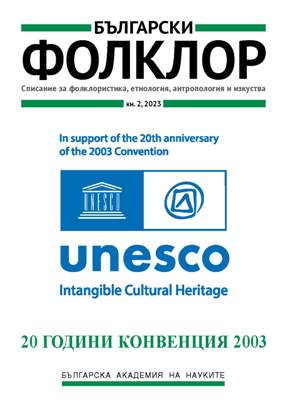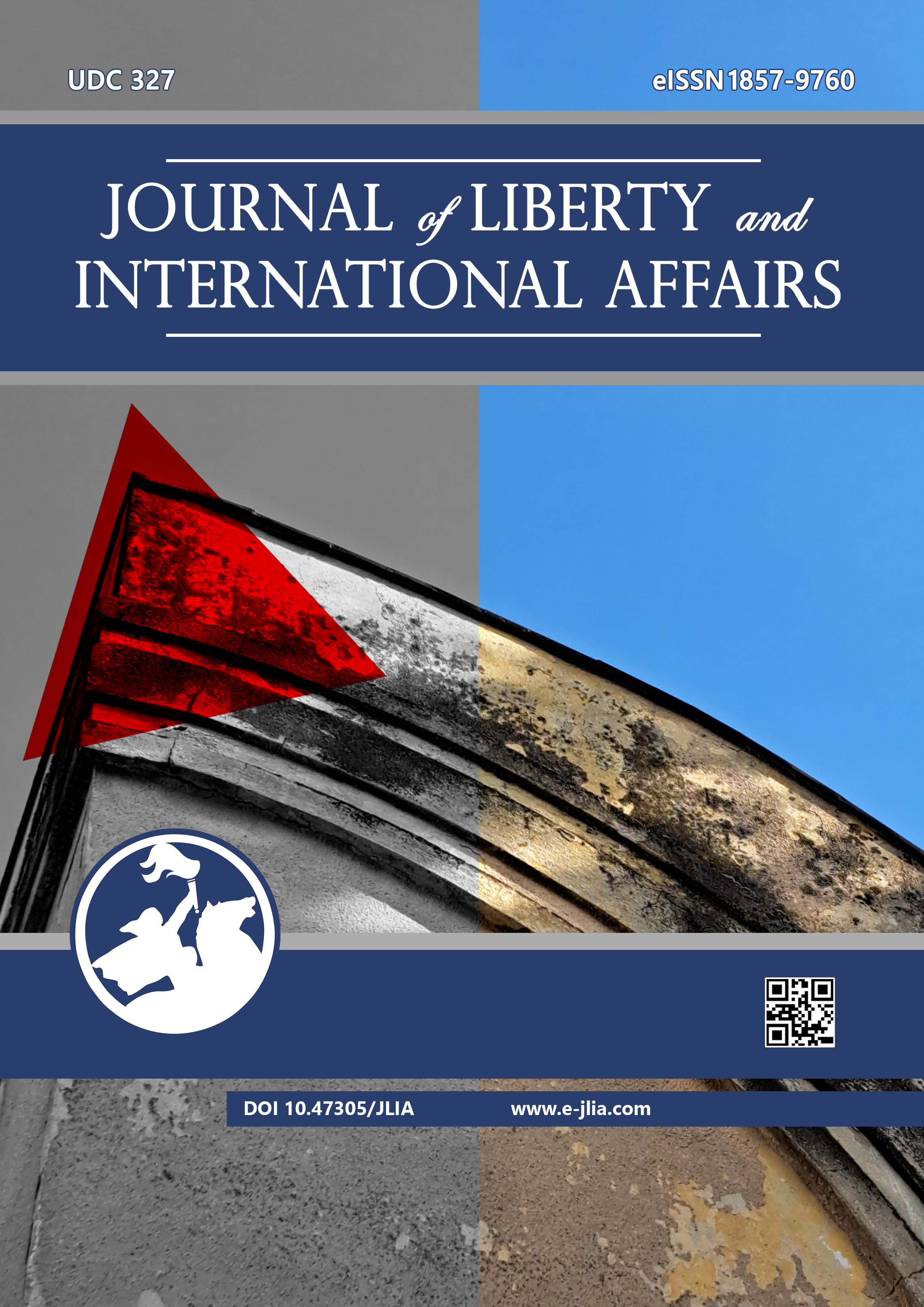
We kindly inform you that, as long as the subject affiliation of our 300.000+ articles is in progress, you might get unsufficient or no results on your third level or second level search. In this case, please broaden your search criteria.


The paper analyses the evolution of the notion of cultural heritage from a comparative perspective and verifies the impact produced by the UNESCO Convention for the Safeguarding of the Intangible Cultural Heritage in 9 countries (Mexico, Brazil, Italy, Jordan, Cyprus, Spain, Burkina Faso, Korea, Japan).
More...
This article examines the process of safeguarding intangible cultural heritage as a factor for sustainable development. It traces and highlights the synergies between intangible cultural heritage and sustainable development. At the same time the author explores the interconnections between the different domains of intangible cultural heritage and the achievement of the Sustainable Development Goals, through the normative documents of the leading international organisations in the field.
More...
As UNESCO’s Convention for the Safeguarding of the Intangible Cultural Heritage turns twenty, the article focuses on its primary aim of safeguarding people’s living cultural traditions, practices, and expressions at the local level. Safeguarding measures are promoted throughout the Convention and related texts, but it is arguably the Register of Good Safeguarding Practices through which actual approaches are presented as being put to the test. The article uses the Register as a launchpad for examining community-based approaches to safeguarding ICH, and distilling “good” considerations for building ethical and equitable collaborations – from the first steps of initiatives to over the long term.
More...
This article reviews two co-existing and mutually conflicting concepts in Bulgaria: the one of folklore and the policies of its conservation in the course of the 20th century, and the one of intangible cultural heritage (ICH) and the efforts for safeguarding it following the adoption, in 2003, of the relevant UNESCO Convention. A comparison is made between the folklore festivals, characteristic of the second half of the 20th century, and the Living Human Treasures Bulgaria National System, created in 2008 as one of the fundamental cultural policies of the Republic of Bulgaria in this sphere, which has resulted in the compiling of the National Representative List of the Intangible Cultural Heritage. Based on observations made during several of its consecutive iterations conducted so far, the article seeks to outline important aspects and issues of the rationalization of ICH and its safeguarding at the present moment. The author draws on her experience as a member of the team of scholars at the Institute of Ethnology and Folklore Studies with Ethnographic Museum of the Bulgarian Academy of Sciences (IEFSEM – BAS), which has been participating actively at expert level in the implementation of the 2003 Convention in Bulgaria.
More...
The 2003 Convention and Its Implementation in Bulgaria
More...
The 2003 Convention and Its Implementation in Bulgaria
More...
The 2003 Convention and Its Implementation in Bulgaria
More...
The 2003 Convention and Its Implementation in Bulgaria
More...

The research conducted in this article is a substantiation of the method for strategic management of the development of the Ukrainian border security environment. The essence of the method is to determine the phases for the current state and the projected period for particular sectors of the state border, depending on their inherent characteristics, further selecting the concept of border security on this basis, establishing the type of barriers and criteria for ensuring border security that are appropriate for use. Further application of the methodology involves conducting a SWOT analysis for particular sectors of the state border, which identifies the strengths and weaknesses of the internal environment, opportunities and threats inherent in the external environment, and the formation of possible strategies for ensuring border security in three variants of organizing activities (in the conditions of day-to-day activities, a complication of the situation and martial law). Based on the results of the analysis and the illustrative example, it can be concluded that the proposed method for strategic management of the development of Ukraine’s border security environment is one of the possible effective mechanisms in the activities of the subjects ensuring Ukraine’s border security.
More...
The political changes after 1989 in Bulgaria and the country’s difficult economic transition, temporarily led to a decline in patriotic feelings among the Bulgarian people. With few exceptions, such as Bulgaria's triumphant performance at the 1994 World Cup, which led to unprecedented national pride, the idea of belonging and unity began to dissolve in the harsh and uncertain conditions of the transition from socialism to a market economy. This led to a deterioration of relations in Bulgarian society, a sharp revision of values, a decrease in tolerance, and the entering into everyday life of the so-called language of hatred. Political parties were created which, under the guise of patriotism, openly promoted more radical sentiments toward various types of minorities. An increase in domestic crime at the time proved to be a fertile ground for such rhetoric. The fact that from the beginning of the new millennium until now, some Bulgarians have been invariably supporting nationalist parties, shows that these political formations are an expression of permanently present sentiments in the Bulgarian society. The current text will focus on nationalist manifestations towards the second-largest ethnic minority in the country – the Roma. For this purpose, specific events will be examined and analysed, and an attempt will be made to provide answers to several questions such as: What is the role of the Bulgarian minorities in these nationalist attitudes? Is it possible to build an identity based on the rejection of the other, and what are the manifestations of this rejection? How do such manifestations of intolerance and confrontation reflect on the identity of the minority itself? Who benefits from this rhetoric, and what are its consequences for the Bulgarian society?
More...
The article proposes to refine the periodisation of Russian and Russian-speaking immigration in Bulgaria. It examines the necessary context, describing changes in motivations and identity projects of these groups from (relatively) 2013 to 2023. The text outlines the specific tool - the blog, reinvented in a modern context – the text highlights the differences between it within the visual platform Instagram and its classical visual version. Thus, some of the main features of Russian-speaking users’ own online representations are brought to the fore through the implicit and (counterintuitively) explicit discourses of Russian-speaking users. They focus the analysis on their identifications and the specifics of adaptation and its dynamics, maintaining a sense of community but also accumulating social capital that directly reflects their plans and strategies for the present and future.
More...


Artanuji, the oldest city of Klarjeti, historical Georgia, is within the boundaries of Turkey on the grounds of Kars Treaty (1921). According to the data, gathered through the fieldwork in 2010‒2014, ethnic Georgians were exiled from Artanuji after the World War II. The article deals with the written sources and field data, providing detailed information about the Artanuji population, ethnic Christian Georgians as well as Muslim Georgians. The historical past in this region reminds of itself through the toponyms that appeared in the places of historical Georgia and through the speech of population and covers the history of the ethnic groups. The toponyms attested on the territory of historical Georgia have a great importance for they shed light on a certain period of history and are the only witnesses of Georgian settlement here.
More...
The article briefly evaluates the vast literature relating to the worship of St. George in Georgia and draws on the ethnographic data collected by the author in the years 1977 to 1987. It explores the worship of St George in the Caucasus Georgia both in the past and present. Consequently, it discusses such categories as religious practice, belonging to the parish and territory, identity and, sharing holy places, epithets of the Saint, hybrid cults, etc. The materials used are: written historical sources, ethnographic data attested in the writings of Christian Missionaries (Christopher Castelli, Jean Chardin, Arcangelo Lamberti, etc.), the ethnographic data gathered (during 2018-19) among Internally displaced persons, and contemporary emic and etic researches undertaken by anthropologists of the 20th and 21st centuries. The argument of the present contribution is based upon a series of ethnographic observances that present traditional feasts of the saint and their transformations in the light of current political processes. Accordingly, detailed ethnographic field data and observations are contextualized in time and space, using the explorations and studies of anthropologists and historians. The article tries to show how once traditional Christian site (lieux de mémoire in Pierre Nora’s sense) with its real environment and with is firm identity is deterritorialized and transformed into a shared place of mixed and ambiguous pilgrimage place through the political processes and hybridization.
More...
Georgian everyday life is highly tied up with the rich religious traditions that have been developed as a result of the centuries-long synthesis of pre-Christian and Christian practices and worldviews. The Soviet period caused the fragmentation of the traditional religious knowledge and the practice moved to the household level and was paganized. In the post-Soviet period, the burst of religious sentiments and search for identity increased the involvement of big masses to religious practices. The transformations were accompanied by a process of individualization of religion, which has led to a change of forms of religiosity. Based on the ethnographic data of East Georgia, the article discusses the correlation of the normative, vernacular and resistant forms of religiosity. Historical-comparative and parallel analyses are used to research two examples of religious practice: Lomisoba and Berikaoba. Lomisoba is analyzed as an example of hybrid, massive, collective holiday. Berikaoba is more local, not connected to a sacred site, performative festival. It is argued that the contemporary processes are having an impact on the religiosity and the religiosity of certain groups is trying to be defined in new forms. All the old and new forms of religiosity are explicitly displayed and played out in contemporary Georgia. At the same time there are some hidden, or rather implicit practices.
More...
The article introduces to the late medieval romance in verse Vepkhistq’aosani by Shota Rustaveli – the central artefact in Georgian cultural self-awareness and the top item of ‘high’ Georgian cultural export. It briefly presents its narrative content, indicating the correlation of two plot-lines (initially through enframing, after some point though horizontal interlacing). It briefly introduces to the main fluctuations and 20th-century tendency in translating the work’s title, interpreting the fluctuations as indicative of aesthetic differences, and the tendency as an indication of the ‘cultural market’ success of the Soviet-Georgian (in its ideological and aesthetical basis –a Stalinist and socialist-realist) image of Rustaveli’s masterpiece. It presents two influential to dominant claims of Georgian Rustvelology – that the work is a poema (and not a novel/romance) and that it displays, at least partially, Renaissance outlook and poetics, – considering these claims as tools (1) of Soviet “Culture Two” to allot a proper place to Georgian nation within the alternative modernity of the USSR and its premodern background-under-construction, and (2) of Soviet-Georgian cultural nationalism to define a usable past in post-Soviet conditions; and (3) as beliefs. It revitalises the option to contextualise the work of Rustaveli (and, indirectly, Georgian cultural identity) in non-Eurocentric terms, providing some factographic and theoretic clues from the field of macrohistory (J. Abu-Lughod et al.) and a methodological one from sociology of arts (P. Bourdieu).
More...
Book reviewCultural Heritage and Institutionalization of Bulgarian Historical and Contemporary Migrant Communities beyond Europe [In Bulgarian]. Authors: Vladimir Penchev, Aneliya Avdjieva Mariyanka Borisova, Valentin Voskresenski, Nikolai Vukov, Lina Gergova, Yana Gergova, Boyan Kulov, Tanya Matanova, Shteryo Shterev. Editors: Vladimir Penchev, Tanya Matanova, Aneliya Avdjieva. Sofia: Paradigma, 2023
More...